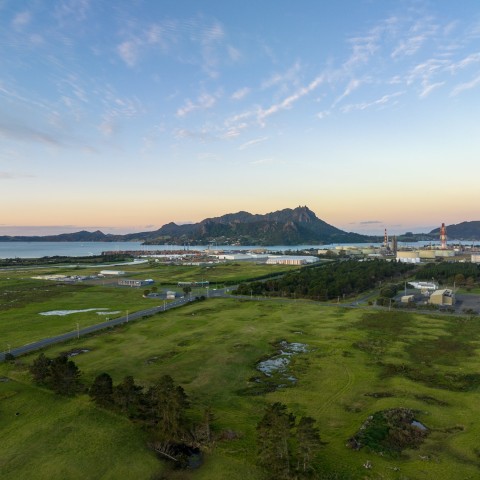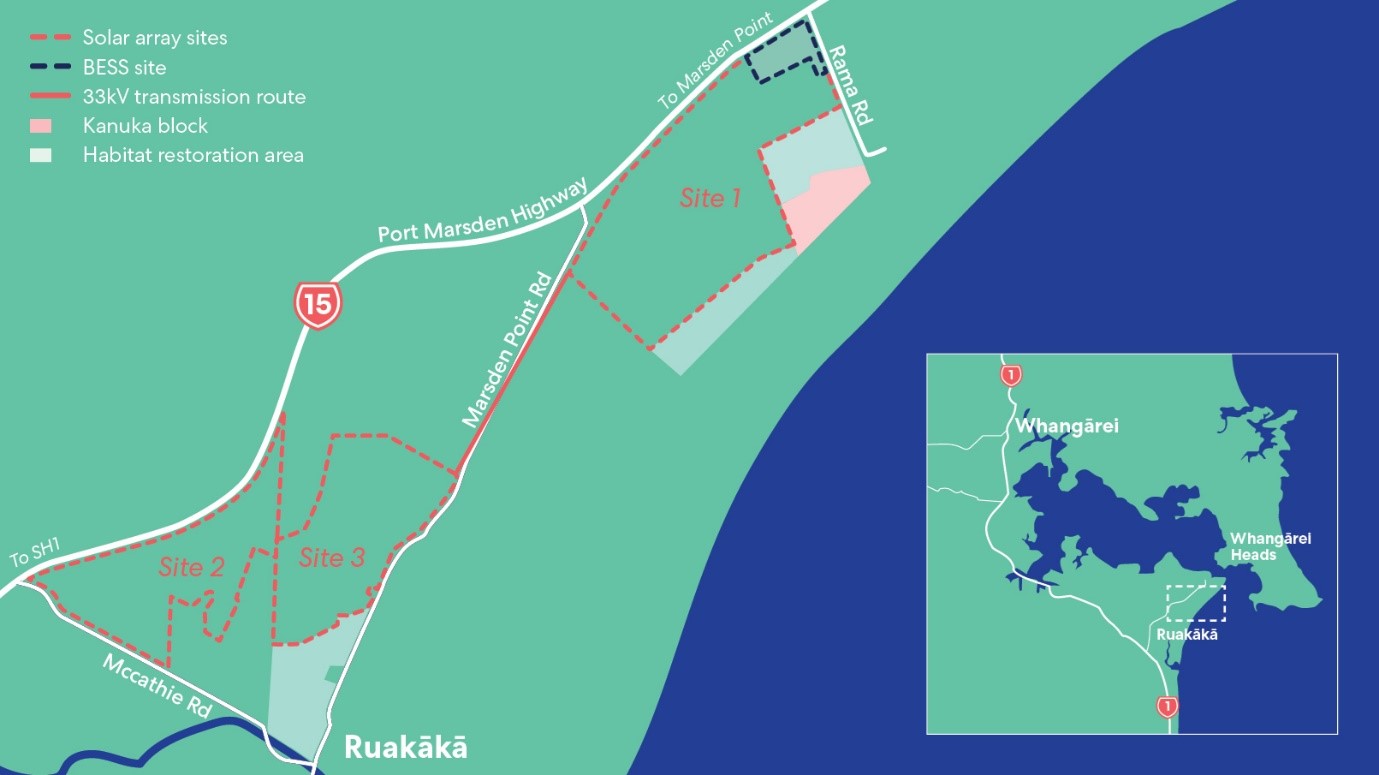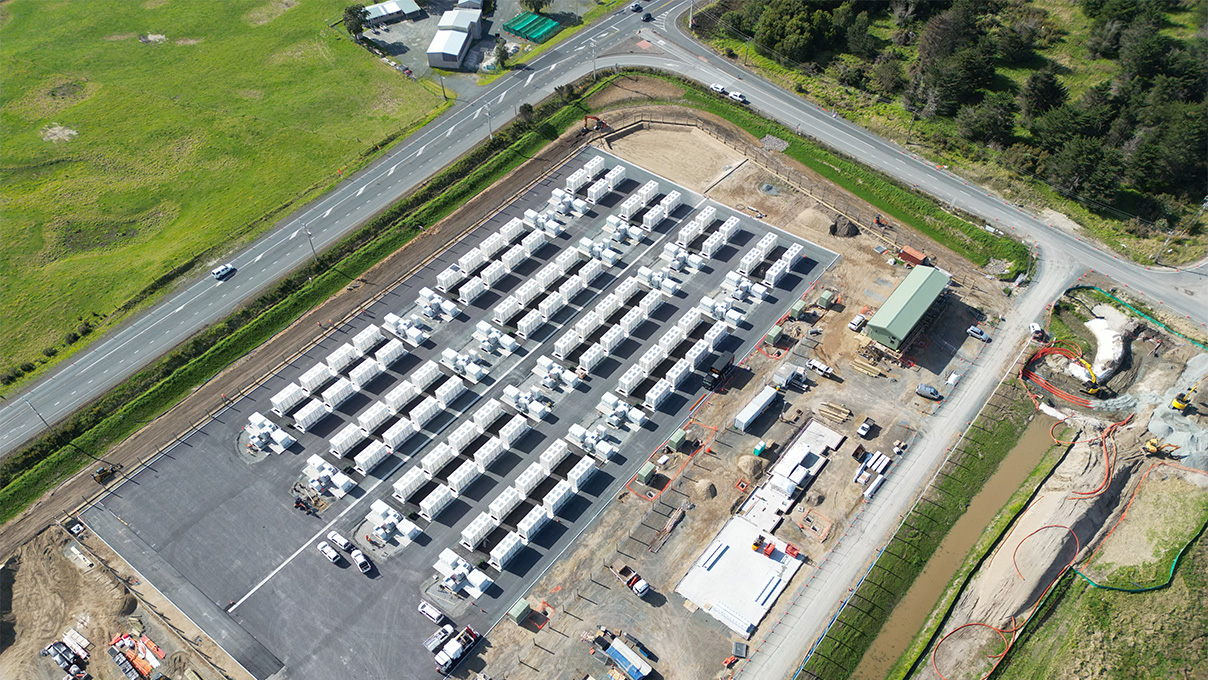Ruakākā Energy Park
Ruakākā Energy Park combines a 100-megawatt battery energy storage system (BESS), currently under construction, and a proposed 130-megawatt solar farm located near Marsden Point and Whangārei.

Ruakākā Energy Park combines a 100-megawatt battery energy storage system (BESS), currently under construction, and a proposed 130-megawatt solar farm located near Marsden Point and Whangārei.
Meridian is committed to increasing the amount of renewable electricity we generate and store so that we can meet New Zealand’s growing demand for electricity with clean energy.
Solar farms and batteries, alongside hydro stations and wind farms, are part of the solution to reduce New Zealand’s reliance on fossil fuels and support our transition to a resilient net zero economy.
The Ruakākā Energy Park in Northland will reduce the reliance on electricity generated from other parts of the country and help improve the security of electricity supply for all kiwis.

The first stage of the Ruakākā Energy Park is a BESS that will store electricity which can then be shared with the national grid when it’s needed most.
The Ruakākā BESS have a maximum output of 100MW of electricity. It has a storage capacity of 200MWh, which means its maximum output – enough to power around 60,000 average households during winter – can be sustained for two hours. It will be connected directly to Transpower's Bream Bay substation at 33kV.
Construction of the Ruakākā BESS began in early 2023 and commissioning is now underway, with the project on schedule for completion in the first half of 2025.
The video features a combination of aerial and ground shots of the Ruakākā Energy Park construction site. Interviewees are speaking with ongoing construction work visible in the background.
Johnny Wilkinson, McKay Ltd Site Manager: Absolutely, this is the future. Well, it’s a battery (laughs).
Paul Bonetti, United Civil Construction Group Manager: We’re on site at Meridian’s BESS project, Ruakākā. This is the first large-scale battery project of its type in the country, and we’re really excited to be involved in this project.
Leanne Robb, Meridian Procurement Engineer: If the grid requires more power, having the battery here will enable us to respond quite quickly without needing sun or water or wind.
Johnny Wilkinson: First of its kind, pretty awesome to be part of.
Leanne Robb: So it’s 100 megawatts of power, for two hours.
Johnny Wilkinson: So it’s a real good thing for the country, for the world as well.
Paul Bonetti: This project’s great for us to be able to work locally and there’s a strong component of using local labour.
Leanne Robb: I really wanted to be able to make a difference as part of New Zealand’s energy transition.
Johnny Wilkinson: And of course, it’s a new industry for a lot of people to get into. So a lot of development dollars for the country all the way down.
Mike Wilson, Meridian Project Manager, BESS: Being the first to build this is a gutsy move. I’m very pleased to be working on this project and proud to be here.
Leanne Robb: It’ll be fun to drive past in 20 years’ time, hopefully, and see it still operating. It’s always exciting to be involved in a project like this, knowing that you’re doing something for the greater good of the country.
Battery energy storage systems are set to play an increasingly important role in New Zealand’s electricity supply.
As companies like Meridian grow the amount of renewable energy from sources such as wind and sun – where the timing of generation can’t be guaranteed – battery energy storage systems provide somewhere to store energy for use when demand is high.
This will help smooth out fluctuations in energy supply, and ensure a more secure, stable and resilient electricity grid.

The second stage of the Ruakākā Energy Park is a proposed 130MW solar farm. This will cover about 163ha of the 201ha project site and produce up to 230GWh of energy per year from about 250,000 solar panels.
That’s enough to power over half of Northland’s homes in an average year.
Solar energy will be conveyed to the switching station located at the BESS site, via several inverter stations and a 33kV connection, prior to injection into the national grid at Transpower’s Bream Bay substation.
Planting will be used to screen the solar farm from neighbouring properties and the road.
We are currently working through the detailed design of the project and expect construction to start in mid-2025.
As part of the solar farm development, we plan to enhance and protect an existing 18ha wetland on site 1, which is significantly degraded after many years of cattle grazing. We will also create a new native habitat area of around 11.7ha, including a new 5ha wetland on site 3.
These will provide habitats for taonga bird species such as bittern and dabchick ducks. The new wetland will help cleanse stormwater from the energy park and wider catchment before it flows into the Ruakākā River, delivering significant environmental benefits.
To receive our Ruakākā Energy Park community newsletter, please email ruakaka@meridian.co.nz
Tackling Zero is Meridian’s quarterly newsletter for people whose roles or studies are focused on sustainability, or for whom this is an area of interest. Each issue will offer Meridian’s insights into a topical sustainability issue, as well as stories on how we, our customers and supply chain partners are tackling sustainability. It also includes links to recent Meridian disclosures such as new policies and reports.